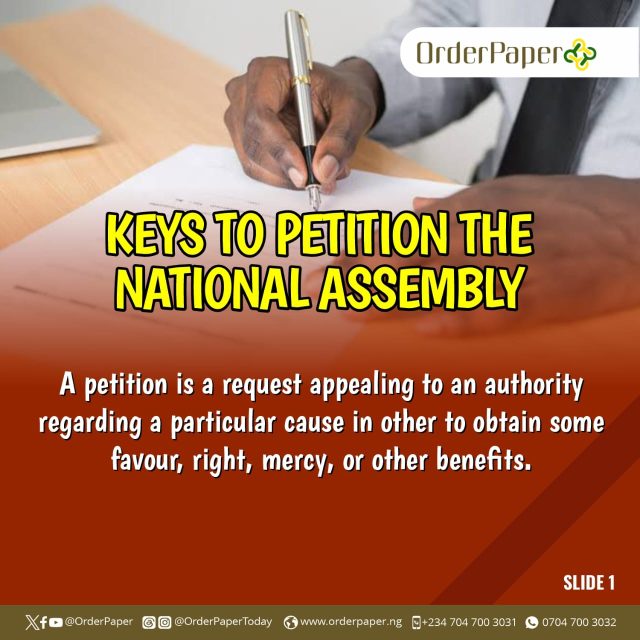In this explainer, OrderPaper’s Joy Erurane Oluwakemisola shares five quick things to note about making a difference in writing a petition to the National Assembly.

Have you ever felt frustrated by an unfair situation or injustice in Nigeria that left you feeling powerless or helpless? Let me give you a free tip that actually works!
As a Nigerian citizen, you have the right to freedom of expression, including the right to own, establish, and operate any medium for the dissemination of information, ideas, and opinions, as outlined in the Constitution of the Federal Republic of Nigeria (As amended). This includes the right to submit petitions to appropriate authorities or organisations to address grievances, fight administrative injustice, and stand up against human rights abuses or other violations suffered.
Do you want to address those grievances and concerns within the boundaries of the law in a peaceful manner?
In this article, we’ll break down the “cumbersome” processes and procedures to help you petition the National Assembly regarding complaints on violations of your rights. Let’s dive into it!
First of all, what’s a petition?
A petition is a request appealing to an authority regarding a particular cause in order to obtain some favour, right, mercy, or other benefits.
The National Assembly plays a crucial role in addressing these petitions from members of the public who feel aggrieved, have suffered injustice or have been short-changed in one way or the other. Both chambers of the National Assembly have a Committee on Ethics, Privileges and Public Petitions constituted to address these petitions from citizens.
These committees are generally guided by the Constitution of the Federal Republic of Nigeria (as amended), Standing orders of the Senate/House of Representatives (as amended) and the principle of equity, fairness, and justice.
Now, here are five quick things to note about petitioning the National Assembly
- To start the process, the aggrieved member of the public who wants the National Assembly to intervene is required to present his/her case through a legislator.
- Upon receiving the petition, the legislator presents it on the floor of the Senate/House and is subsequently referred to the Committee on Public Petitions without any debate to ensure an unbiased review.
- However, the National Assembly will not intervene in any matter that is already in court, respecting the separation of powers.
- Once the petition is referred, the Committee immediately takes responsibility, invites all relevant parties and listens to their oral testimonies and written submissions.
- Based on the gathered testimonies and submissions of the affected parties, the committee will deliberate, make its observations and arrive at its findings. The Committee’s recommendations will then be presented at the plenary session of Senate/House of Representatives, where they are passed as resolutions of the Senate/House of Representatives.
And that’s it! Easy right?
With the rampant complaints against human rights violations, injustice and public institutions and agencies, I know this will come in handy. You’re welcome!
Now that you know the procedures to petition the National Assembly, are you writing a petition today?
READ ALSO: OrderPaper’s Epia, Hon Abonta, to speak at IPU global seminar




One comment
Ibrahim, Monsurat Omolola
May 3, 2024 at 1:10 pm
Thank you so much for this but I need a guide as the steps listed here is not explanatory enough.